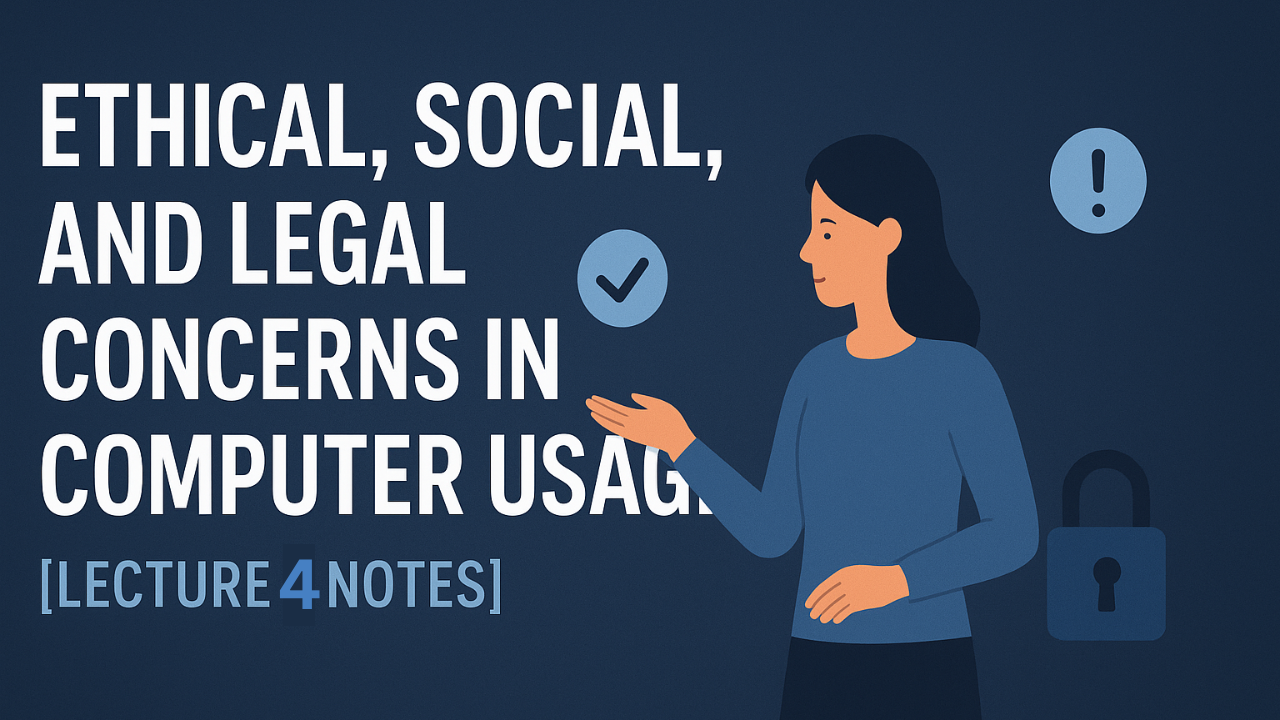Introduction
Computing technology has a huge influence on the way people live, work, and communicate. It brings many benefits but also creates challenges that affect individuals, businesses, and society as a whole.
Ethical Impact
Definition: Ethics is about what is right and wrong in the use of technology.
Example: Copying someone’s project or downloading pirated movies without permission is unethical.
Extra[You can skip this during writing on notebooks. It is just an extra knowledge.]Why It Matters: Respecting copyright, honesty in data usage, and giving credit to creators helps build trust in the digital world.
Legal Impact
Definition: Legal issues involve laws and regulations related to computing.
Example: Privacy laws protect your personal data from being sold or misused without your consent.
Extra[You can skip this during writing on notebooks. It is just an extra knowledge.]Why It Matters: Knowing your legal rights online helps protect yourself from fraud, scams, and data misuse.
Societal Impact
Definition: The way technology changes how people interact and connect.
Positive Example: Social media helps people stay in touch globally.
Negative Example: Cyberbullying and online harassment affect mental health.
Extra[You can skip this during writing on notebooks. It is just an extra knowledge.]Why It Matters: Awareness helps us use technology responsibly and for positive purposes.
Economic Impact
Definition: The effect of computing on jobs, industries, and money.
Positive Example: New fields like software development, app design, and digital marketing create jobs.
Negative Example: Automation (robots, AI) may replace traditional jobs like clerks or factory workers.
Extra[You can skip this during writing on notebooks. It is just an extra knowledge.]Why It Matters: People must learn new digital skills to adapt to changing job markets.
Cultural Impact
Definition: Computing influences how cultures are shared and preserved.
Example: Platforms like YouTube, TikTok, and Instagram let people showcase traditions, music, and art to the world.
Extra[You can skip this during writing on notebooks. It is just an extra knowledge.]Why It Matters: It promotes cultural exchange but can also cause cultural blending or loss of traditions.
Environmental Impact
Definition: The effect of technology on the natural environment.
Example: Computers and phones require electricity and rare minerals; discarded e-waste pollutes the environment.
Extra[You can skip this during writing on notebooks. It is just an extra knowledge.]Why It Matters: Encourages recycling, energy efficiency, and green computing.
Role of Computing in Global Trade, Communication, and Cultural Evolution
Global Trade
- Computers power e-commerce websites like Amazon, AliExpress, and Daraz.
- Businesses use computing systems for managing inventory, tracking shipments, and processing payments.
- Result: Easier global buying and selling.
Communication
- Email, WhatsApp, Zoom, and social media allow instant communication worldwide.
- Video calls make work-from-home and online classes possible.
- Result: Faster global collaboration.
Cultural Evolution
- Platforms like YouTube, TikTok, and Instagram spread cultural traditions globally.
- People learn about food, festivals, music, and lifestyles from other countries.
- Result: Cultural exchange and awareness.
Assessing Computing Advancements: Benefits and Risks
Benefit – Social Networking
Helps people stay connected, share news, and build communities.
Example: Facebook groups connect students, workers, or hobbyists worldwide.
Risk – Misinformation
False information spreads quickly on social media.
Example: Fake news about health can cause panic or harmful actions.
Solution: Always verify from trusted sources before sharing.
Trade-offs Between Privacy, Security, and Usability
Privacy vs. Usability
More privacy often means less convenience.
Example: Two-factor authentication keeps accounts safe but takes extra time.
Balance Needed: Protect privacy while keeping systems user-friendly.
Security vs. Usability
High security sometimes makes systems harder to use.
Example: Complex banking apps with many verification steps.
Balance Needed: Secure systems must still be simple enough for users to access easily.
Extra Points
- Digital Divide – Some people have more access to computing technology than others, leading to inequality.
- Health Concerns – Excessive use of computers can cause eye strain, back pain, and poor posture.
- Education – Online learning platforms provide new opportunities but require internet access and digital literacy.
- Cybersecurity Threats – Viruses, hacking, and phishing attacks pose risks to individuals and organizations.
- Future of Computing – Quantum computing and AI will bring both opportunities and challenges for society.
MCQs
1. Which of the following is a positive economic impact of computing?
- A) Cyberbullying
- B) Automation job loss
- C) Creation of new jobs in IT
- D) E-waste pollution
Answer: C) Creation of new jobs in IT
2. Which technology enables global collaboration through instant communication?
- A) Typewriters
- B) Social Media & Video Calls
- C) Steam Engines
- D) Printing Press
Answer: B) Social Media & Video Calls
3. What is a major risk of social networking?
- A) Building communities
- B) Fake news and misinformation
- C) Sharing hobbies
- D) Global connections
Answer: B) Fake news and misinformation
4. Which of the following is an environmental issue related to computing?
- A) Cybersecurity threats
- B) Cultural blending
- C) E-waste pollution
- D) Social media addiction
Answer: C) E-waste pollution
5. Two-factor authentication is an example of:
- A) Privacy vs. Usability trade-off
- B) Cultural Impact
- C) Environmental Impact
- D) Economic Benefit
Answer: A) Privacy vs. Usability trade-off
